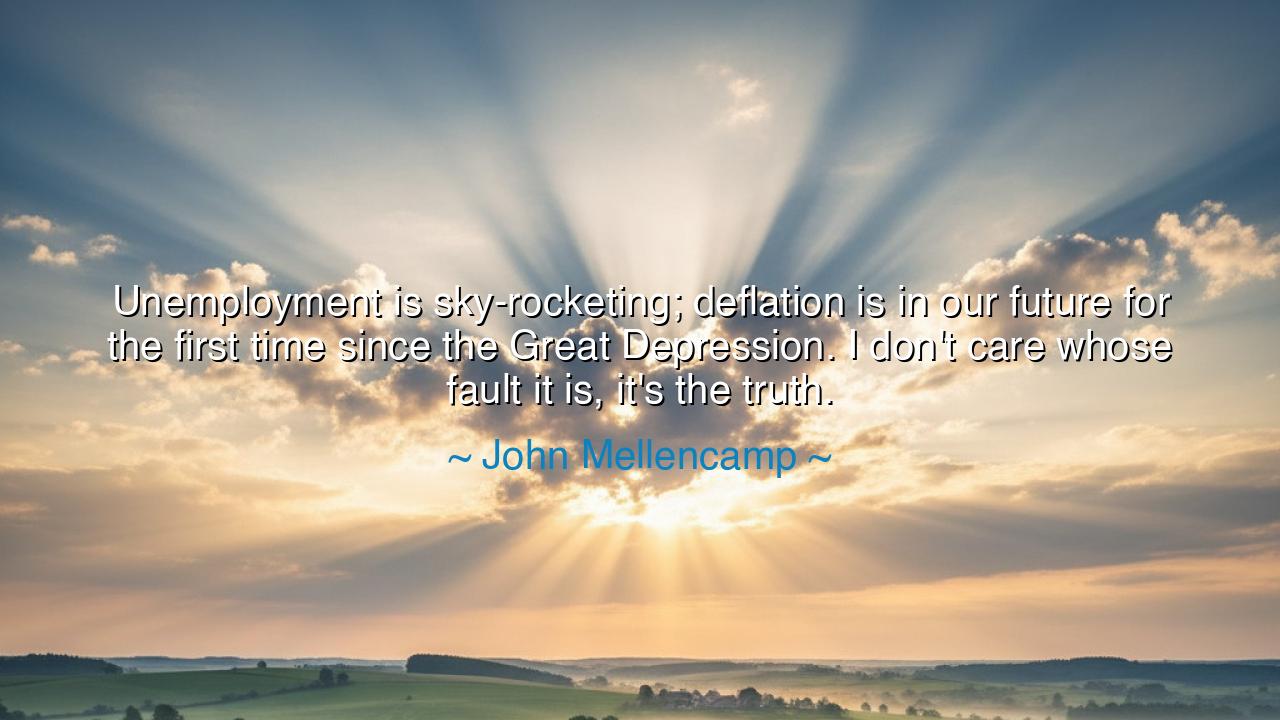
Unemployment is sky-rocketing; deflation is in our future for the
Unemployment is sky-rocketing; deflation is in our future for the first time since the Great Depression. I don't care whose fault it is, it's the truth.






In the face of adversity, there are moments when truth cannot be avoided, no matter how uncomfortable or inconvenient it may be. John Mellencamp captures this sentiment when he declares, "Unemployment is sky-rocketing; deflation is in our future for the first time since the Great Depression. I don't care whose fault it is, it's the truth." His words, raw and unflinching, reflect the unavoidable reality that difficult economic times are upon us, a stark reminder that truth remains, regardless of who is to blame. Mellencamp’s message echoes a deeper principle that transcends time—when society faces hardship, it is not enough to assign blame; one must face the truth and act accordingly.
The ancients understood the profound consequences of economic hardship. In ancient Rome, the fall of the Republic was largely due to a collapse of the economy—poverty, unemployment, and a decaying system of labor that left the Roman citizens vulnerable. The plebeians—those who once worked the fields and built the infrastructure of Rome—found themselves increasingly disenfranchised, unable to find work or sustenance as the empire expanded and wealth became concentrated in the hands of the few. Cicero, the great Roman philosopher and statesman, often lamented the erosion of social stability caused by such disparities. His reflections on the rise of the Roman Empire emphasize that no amount of external glory or military might could save a society that neglected the truth of its economic injustice. Mellencamp's words point to a similar truth: when the economic foundations of a society weaken, the entire system is at risk.
In the time of ancient Greece, the philosopher Plato warned of the consequences of economic imbalance and the corruption of the ruling class. In his work The Republic, Plato examined how the decay of a society’s values often coincided with economic decline. The common people, whom he called the producers, were often left at the mercy of the aristocracy, who grew rich while the majority struggled. Plato’s portrayal of a society that fails to address its economic disparities mirrors the warning in Mellencamp’s words: if the truth of economic inequality and suffering is ignored, it leads to instability, disillusionment, and the eventual collapse of the system.
Mellencamp’s assertion that "I don’t care whose fault it is" speaks to the human tendency to assign blame in times of crisis, a tendency that clouds the path to progress. The ancients knew that in times of great trial, the focus must not be on finger-pointing, but on finding solutions and understanding. Consider Alexander the Great, whose campaigns, though filled with glory, were marred by the suffering of his people. Despite facing difficulties, Alexander never turned inward to blame others but sought to unite his forces and adapt to changing circumstances. Like Alexander, Mellencamp calls us not to dwell on blame, but to face the truth and seek ways to remedy the situation.
John Mellencamp’s message speaks directly to the nature of truth and its relationship to action. In times of economic turmoil, truth must be faced, even if it leads to uncomfortable realizations. The ancient Stoics, such as Seneca, taught that true wisdom comes not in avoiding unpleasant truths, but in confronting them with clarity and purpose. Seneca emphasized that our inner peace and ability to act with integrity come from our willingness to face reality, regardless of the external chaos around us. Mellencamp's insistence on recognizing the truth about economic collapse mirrors the Stoic ideal: acknowledging the truth is the first step toward empowerment and change.
The lesson we can take from Mellencamp’s words is the necessity of facing harsh truths head-on, without getting bogged down in the urge to blame others. We must look at our current situation—whether on a societal level or in our own lives—and recognize what is truly happening. In times of crisis, inaction or denial can be as destructive as the crisis itself. We must be willing to acknowledge the truth, even when it is difficult, and then take responsibility for finding solutions. Whether addressing economic struggles, personal challenges, or societal issues, the first step is always to face reality, not hide from it.
Practical action comes next: to empower ourselves and our communities, we must shift the conversation away from blame and toward collective action. If unemployment rises, we must focus on creating opportunities and supporting one another through solidarity and innovation. If deflation threatens to disrupt our way of life, we must turn to sustainable practices that will provide stability for future generations. Mellencamp’s words encourage us to rise above the difficult realities and take charge of shaping a future where we face the truth not with fear, but with a commitment to the greater good. Just as the ancients found strength in self-reflection and action, so too must we embrace the truth of our current circumstances and build a better tomorrow through collective resolve and honesty.






AAdministratorAdministrator
Welcome, honored guests. Please leave a comment, we will respond soon